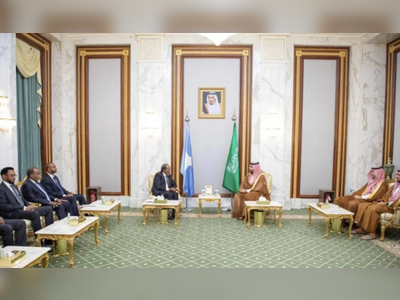
Israel's Security Cabinet Approves Ceasefire with Hamas in Gaza
A landmark agreement promises a pause in hostilities in Gaza, exchanging hostages and prisoners amidst international diplomatic efforts.
In a significant development in the ongoing conflict between Israel and the Palestinian militant group Hamas, Israel's security cabinet has approved a ceasefire agreement that aims to halt the 15-month war in Gaza for an initial period of six weeks.
The arrangement, brokered following intense negotiations involving Egyptian and Qatari mediators and supported by international figures including U.S. President Joe Biden, will facilitate the exchange of hostages held by Hamas for Palestinians imprisoned in Israel.
The decision was ratified despite internal tensions within the Israeli government, with Prime Minister Benjamin Netanyahu's coalition facing potential destabilization due to dissent from far-right members.
National Security Minister Itamar Ben-Gvir threatened to resign over the terms of the deal, which he and other critics argue could embolden Hamas by releasing individuals convicted of violent offenses against Israelis.
The agreement, now pending final approval by the full Israeli cabinet, outlines a phased release process beginning Sunday, involving 33 Israeli hostages including children, women, and elderly men, in exchange for hundreds of Palestinian prisoners.
High-profile prisoners slated for release include Khalida Jarrar, a prominent Palestinian lawmaker, signifying the contentious nature of such exchanges.
The deal also seeks to enhance the humanitarian situation in Gaza, which has seen devastating effects from prolonged hostilities.
Plans include increased aid flow—raising daily trucks of humanitarian supplies from 500 to 600—to tackle acute shortages of food, medicine, and fuel in the region.
Israel's military activities have persisted, with Israeli Defense Forces carrying out extensive strikes in Gaza even after the ceasefire announcement, underscoring the precarious nature of the agreement.
Reports indicate ongoing casualties, with Palestinian health authorities citing fatalities in newly targeted areas.
Amidst the complexity of the agreement, the international community, including French President Emmanuel Macron, has expressed cautious optimism, emphasizing relief for hostages involved and advocating for a long-term resolution grounded in the two-state solution.
As the ceasefire implementation draws near, logistical preparations have been established, with Israeli negotiators meeting in Cairo to coordinate the upcoming exchanges.
Meanwhile, the humanitarian aspect remains critical, given the ongoing displacement of Gaza's population and extensive infrastructure damage beckoning considerable international recovery efforts.
The ceasefire presents a momentary pause in a deeply contentious conflict, with broader implications for regional stability and humanitarian response efforts.
Its success hinges upon careful adherence to the agreement terms and sustained diplomatic dialogue between involved parties.
The arrangement, brokered following intense negotiations involving Egyptian and Qatari mediators and supported by international figures including U.S. President Joe Biden, will facilitate the exchange of hostages held by Hamas for Palestinians imprisoned in Israel.
The decision was ratified despite internal tensions within the Israeli government, with Prime Minister Benjamin Netanyahu's coalition facing potential destabilization due to dissent from far-right members.
National Security Minister Itamar Ben-Gvir threatened to resign over the terms of the deal, which he and other critics argue could embolden Hamas by releasing individuals convicted of violent offenses against Israelis.
The agreement, now pending final approval by the full Israeli cabinet, outlines a phased release process beginning Sunday, involving 33 Israeli hostages including children, women, and elderly men, in exchange for hundreds of Palestinian prisoners.
High-profile prisoners slated for release include Khalida Jarrar, a prominent Palestinian lawmaker, signifying the contentious nature of such exchanges.
The deal also seeks to enhance the humanitarian situation in Gaza, which has seen devastating effects from prolonged hostilities.
Plans include increased aid flow—raising daily trucks of humanitarian supplies from 500 to 600—to tackle acute shortages of food, medicine, and fuel in the region.
Israel's military activities have persisted, with Israeli Defense Forces carrying out extensive strikes in Gaza even after the ceasefire announcement, underscoring the precarious nature of the agreement.
Reports indicate ongoing casualties, with Palestinian health authorities citing fatalities in newly targeted areas.
Amidst the complexity of the agreement, the international community, including French President Emmanuel Macron, has expressed cautious optimism, emphasizing relief for hostages involved and advocating for a long-term resolution grounded in the two-state solution.
As the ceasefire implementation draws near, logistical preparations have been established, with Israeli negotiators meeting in Cairo to coordinate the upcoming exchanges.
Meanwhile, the humanitarian aspect remains critical, given the ongoing displacement of Gaza's population and extensive infrastructure damage beckoning considerable international recovery efforts.
The ceasefire presents a momentary pause in a deeply contentious conflict, with broader implications for regional stability and humanitarian response efforts.
Its success hinges upon careful adherence to the agreement terms and sustained diplomatic dialogue between involved parties.







